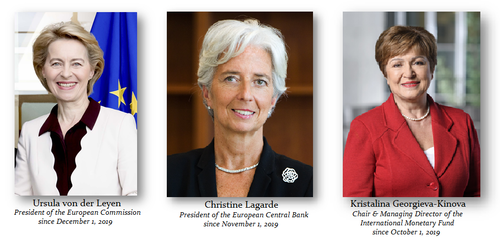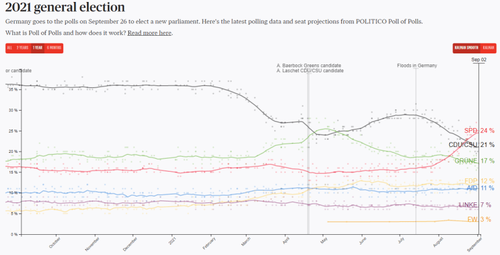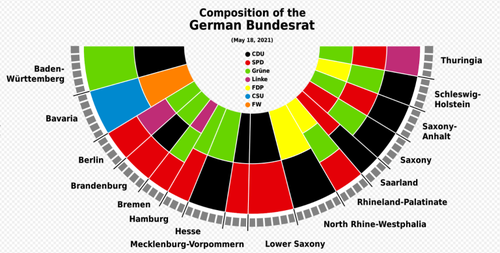We've all been so focused on the internal divisions in the U.S. and with Davos trying to run the table here that we've neglected somewhat old theses about the potential breakup of the European Union.

The EU is a mess. Everyone knows this. Its banks are zombies. Its bond markets oxymorons. Its trade relations with the world degrading. And its relationship with the people it nominally governs is turning toxic.
Moreover, it is led by a bunch of unelected, horrific women who are all the very definition of midwits and ideologues. These are the faces that you want to look at when you consider why women shouldn't run countries, companies or even school boards.
Hell, the older I get, the less I think women should even vote, but we'll leave my wife's wisdom aside for now.

Source: M. Armstrong
Honestly, the only woman not pictured here who should be is French President Emmanuel Macron.
These women were all placed in these positions by Klaus Schwab and George Soros to effect the transformation of the EU from a loose quasi-government into a full technocratic police state. Reading Armstong's comments (linked above) leads you to believe that there is no internal resistance to this plan.
They intent to default on all public debt and replace even pensions with Guaranteed Basic Income. They are moving toward these end goals step by step so the people do not realize what is taking place.
For now, there is still the short-term risk that the dollar rises because Europe has utterly been destroyed and Schwab is in full control. Every strategic person in a key position is also on his board at the WEF.
I do not think, however, that this is the case.
Just like what's happened here in the U.S. with the placement and selection of various leaders into particularly powerful positions to act as gatekeepers of the New Normal proposed by Davos, they have run into staunch opposition at the lower levels of government.
Here we have state governors, routinely ignored or targeted for destruction by Davos, in open revolt. Well, the same thing is happening in Europe.
Now these evil witches will, of course, ignore people taking to the streets in France or Italy. They will suffer the salient criticisms from people like Hungarian Prime Minister Viktor Orban. They do this because they know that the system protects them and believe the momentum of the project is greater than that of the opposition.
But, that may also be a bad assumption on their part.
Because things look to be shifting in places where they think they have the most control and therefore gives them the power to stay on their righteous path. That place is Germany. Because when I see German government house organ, Die Welt, declare fighting inflation is more important than what is happening in Italy, there is a lot more going on than just German hysteria, as the mainstream European press (read: Davos) would have you believe.
DW buries the lede about why Germans hate inflation at the end of the article even with the provocative headline:
The German citizens are particularly affected by the devaluation of money, as they prefer to put their assets into the savings book or the overnight money account. But these are forms of investment where inflation hits unhindered. Economists therefore ask how German citizens will react to this unfamiliar situation.
"Germans have a particularly large amount of savings in cash and in non-interest-bearing bank accounts, the value of which is now threatened by rising inflation," says Schnabl. That could increase the willingness to spend money. This in turn could lead to the fact that the providers use the increased willingness to pay for stronger price increases. Then the risk of an inflation spiral would even increase.
Since cash for depositors in the EU is being taxed at 0.6% annually, 3% inflation in Germany is literally wiping out the middle class there. DW even reminds ECB President Christine Lagarde that she hasn't even mentioned inflation running ahead of her 2% target, because, well, like Powell she believes it's "transitory."
And shouldn't that necessitate ending all the alphabet QE programs? We've reached her target, after all?
Moreover, with gold prices effectively suppressed to be one of the worst asset classes in the world for 2021, Germans have no option there as well.
Let's also not forget that Germany now records all gold transactions greater than €2000. Why would they change that rule just before embarking on massive QE and spending knowing full well what that central bank policy will do to German savers? Hmm… I wonder.
The official Davos position is summed up in this tweet from a German economic 'journalist.'
This inflation hysteria in Germany is really quite something. "Suddenly worse than Italy", the newspaper "Die Welt" titles with regard to recent inflation numbers. A headline playing on inflation phobia and Italy stereotypes - German econ journalism in 2021. pic.twitter.com/NOQqQnwGBw
— Philipp Heimberger (@heimbergecon) September 2, 2021
The tweeter is an idiot who believes in all of the Davosian dogma — Climate Change, EU fiscal unity and and neo-Keynesianism if not outright MMT.
Ignore his bias. What's important is that Die Welt is talking about inflation in these terms a month out from the German Elections where party support can, at best, be described as fluid.

Anyone notice something here? There's 5% missing from the total. Could be rounding errors, could be something else.
Davos' goal is to get the Green party installed, officially, into the national government after years of Angela Merkel getting them installed as the minor party with the whip hand at the State level to control the German Upper House, the Bundesrat.

Note however that since the flooding in May that the Greens have not gotten a bounce at all. The argument that this flooding was because of Climate Change didn't stick. The argument isn't working. Rising inflation and the Greens bloodthirsty foreign policy set them back a lot, revealing the mind of the German voter about what's really important, not what they tell pollsters.
With the polls as they currently stand there is likely no way to keep the Greens out, unless they fall back below the 16% Chasm of public support and crater even further. While the FDP and AfD have both been rising in support, their rise hasn't been fast enough to materially change the electoral calculus, unless the polls in Germany are as fake as they are here in the U.S.
And that's not been my experience, so I'll take them at face value. But also understand that a lot can happen in the next three weeks. Because polls this fluid also point to a public that simply doesn't know what to do.
A significant break could still occur like it did in 2017 when AfD upside surprised polling by 3-5% and took enough to force Merkel into a scramble for months to form a government.
The problem for Davos is that people are not monolithic in how they respond to stimuli. They have screwed the pooch by making everyone's lives so tenuous in their moronic program to destroy the old economic order and 'build back better' that anything is now possible.
Because when people are under truly existential stress they make decisions three to six sigmas away from normal, not less than one. And all of those women who Davos put in charge are the very definition of people who can only see options in terms of gradualism — small, incremental changes leading to small, incremental outcomes.
That's what a midwit is, someone just smart enough to run the production line but not smart enough to deal with it when it breaks.
Davos hasn't gradually pushed us in the past eighteen months. They've broken the world. What they are hoping is people's normalcy bias dampens their response to these catastrophic (in mathematical terms) changes.
That means people shifting from the German equivalent of Republicans (CDU) to Democrats (SPD), but not even considering the Libertarians (AfD). The German people had their one-night-stand with the Greens in 2020, between elections, but now it's time for serious decisions.
And the net effect has been to shift the SPD further to the left and now even consider a government with Die Linke, the remnant of the old German communist party.
So, it looks like Davos is going to get the German government of their dreams. But will it matter? Because if this happens Germany will be signing up for the very thing that the German people explicitly DO NOT WANT — massive inflation to pay for the 'sins' of countries like France and Italy.
Inflation is ultimately where the rubber meets the road in Germany. And the German industrial class that still needs a weak euro to keep exports high cannot at the same time accept high internal inflation which brings with it rising interest rates and a destruction of the middle class.
Germany is at a crossroads financially. It can't go forward without going backwards.
Conversely, France, Italy and Spain all need low interest rates and a relatively strong euro to keep them where they are.
To stay solvent they also need a compliant Germany who will monetize all the debt with the ECB acting as the go-between. Remember the ECB doesn't have the capacity to keep up its various alphabet soup programs going (that all boil down to debt purchases) without the consent of the Bundesbanke in Germany.
The German political polling is therefore at odds with the needs of the German politically-powerful. Because Die Welt running an article that calls German inflation more important than Italy's future is like the New York Times saying Jerome Powell needs to raise interest rates by 200 bps tomorrow.
So, what does this all mean?
It means that we're rapidly approaching that moment Jim Rickards has been talking about for more than ten years, the breaking of the European Union into a Northern currency bloc led by the Germans, Dutch and Danes and the remnant EU led by those financially weakened by the euro's unstable structure for the past thirty years — Italy, France and Spain.
Italy is the prize here. It's the one country both sides want to validate their vision of the future. I don't know if there can be the compromise that will allow for a complete scrapping of the current system and replace it with a direct digital euro issued from the ECB that is acceptable to Germans.
The signs are there in Germany that is only possible if they control the purse strings. With Lagarde in charge of the ECB that will not happen. It has been Merkel's plan to sell Germany out to Davos on this point, manipulating the German electorate into making a confused and disastrous decision at the polls in a couple of weeks.
She may have ultimately succeeded. We'll see.
But it won't be a stable arrangement if the hard left parties — SPD, Greens, Die Linke — can't secure a full majority of seats in the Bundestag (German Lower House). If they don't and either/both AfD and FDP upside surprise then the CDU/CSU will have to be in coalition talks.
The numbers just don't work otherwise.
Not that a CDU/CSU run by Armin Laschet is any great shakes, by any stretch of the imagination. I mean, even Die Linke understands that the EU is Germany's enemy.
The real threat is the one Merkel faced in 2017, which is if they can't come to an arrangement on a government, the polls will shift even farther away from them in any re-vote. There you can expect FDP and AfD to make real, lasting gains.
So, don't expect that at all. This will be Davos' best shot to gain final control over Germany.
Because this Die Welt article is saying that the money behind the CSU/CDU will not go along with what Merkel has maneuvered them into. This is a major shot across the bow.
It's saying, point blank, they have reached their limit. I firmly believe that Merkel thought she could bribe them with Nordstream 2 to get them off her back but, as always, she's underestimated the German people's antipathy to both inflation and creeping totalitarianism, especially in the former East Germany.
Here's the latest INSA poll from Germany. 7% missing. Undecideds are rising.
Germany, INSA poll:
— Europe Elects (@EuropeElects) September 4, 2021
SPD-S&D: 25% (+1)
CDU/CSU-EPP: 20% (-1)
GRÜNE-G/EFA: 16% (-1)
FDP-RE: 13%
AfD-ID: 12% (+1)
LINKE-LEFT: 7% (+1)
+/- vs. 23-27 Aug
Fieldwork: 30 August-3 September 2021
Sample size: 1,427
➤ https://t.co/obOCVirbpF#btw21 #bundestagswahl #Bundestagswahl21 pic.twitter.com/oWoER7iFGw
Another five points by AfD/FDP and the German elections are a push. We'll soon enter the polling blackout period there, so it will be anyone's guess how this shakes out.
That's how close it will be, barring any cheating.
All of this said, the odds are that Davos gets its way here and we will have a repeat of what happened when Helmut Kohl brought Germany into the euro by decree because he knew they would never vote for it. This time they may vote for their own destruction simply because they cannot break free of the propaganda.
That programming runs deep in Europe. When I look at polls looking at 2nd round voting preferences in France they all say the same thing, "Anyone but Marine Le Pen." Even Macron is preferred over Le Pen still, the man that protesting against is literally the only growth industry in present-day France.
But all of that said, even if the Germans vote badly, the government formed will be so weak that it won't survive for long. And then we have the same situation in Germany that we have in the U.S., a weak government with no real mandate trying to force a complete political revolution onto a people that will rapidly become the worst kind of ungovernable.
And then we'll see how much Germans prefer listening to the harangues of unelected harpies in Brussels rather than their own desires.
Commenti
Posta un commento